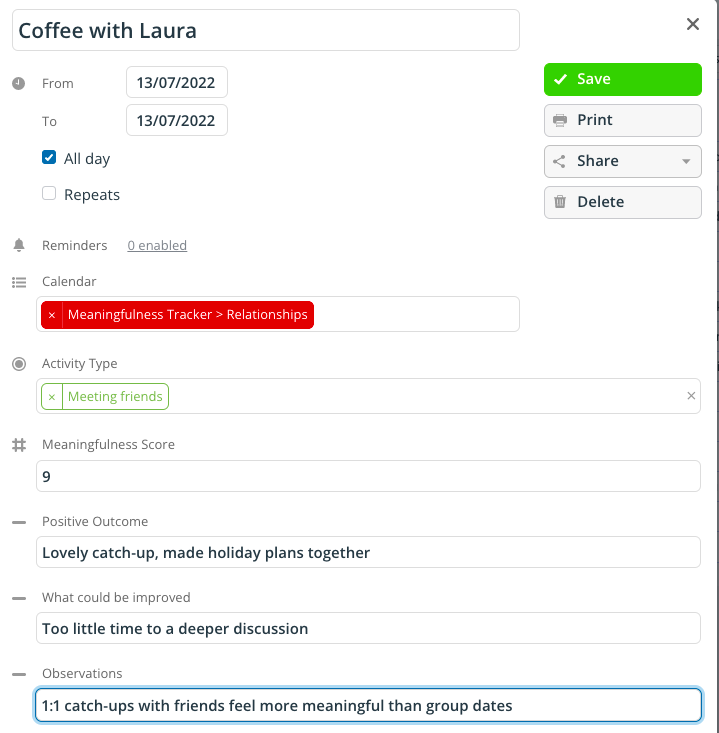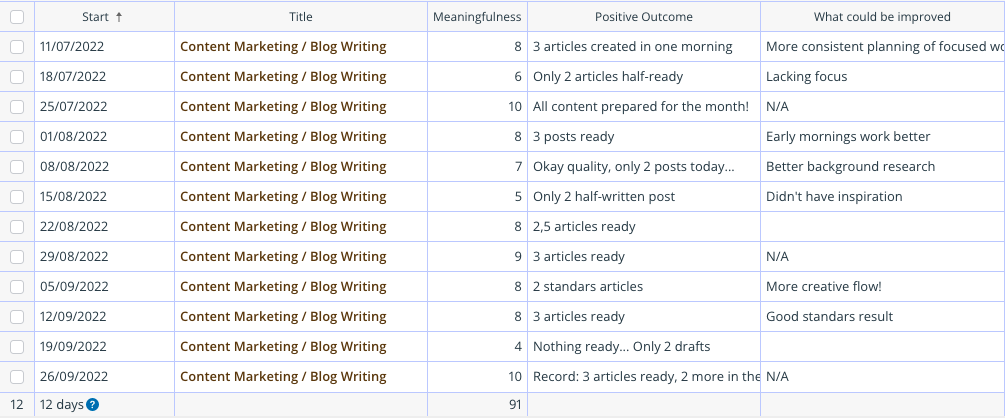Last updated Feb 22, 2024
Packing our days with meetings and deadlines is easy. Checking them off keeps us busy. But being busy does not mean we’re doing what matters. What if you shift your focus: from busy work to meaningful days, for results that matter and help you live a purposeful life? Here are some tips to help you make the shift.
The default of busy
Being busy is not only the modern default, in both professional and private lives, but it’s almost a badge of honor. People compete with each other over how packed their days are, how little sleep they get, how many activities they’ve crammed into their calendars.
Chasing chaos on a calendar leaves us feeling exhausted.
But the level of exhaustion doesn’t mean we’ve done anything meaningful. After another busy day of running around, what was achieved? Do we see any results that matter? Inc.com reports that, over the course of a 45-year career, the average worker spends about 7 years in meetings with no value. That’s 16% of their total working time. Worse, they’ll spend about 10 years of that same career handling useless emails. Combined, about 17 years — 39% of their entire career — is spent on meaningless tasks.
There must be a better way.
Quality over quantity
As professor and author Cal Newport points out in his article about the Fields Medal Winner June Huh, being really intentional about your focus can be the best productivity strategy there is. Newport cites Huh’s schedule, which typically only includes three hours of focused work each day.

“Busyness and exhaustion are often unrelated to the task of producing meaningful results,” explains Newport. “When zoomed in close, three hours of work per day seems painfully, almost artificially slow – an impossibly small amount of time to get things done.”
“Zoom out to the larger scale of years, however, and suddenly June Huh emerges as one of the most, for lack of a better term, productive mathematical minds of his generation.” –Cal Newport
Your calendar – while it can feel like a culprit in this story – is actually your key to freedom. A calendar can send you on a dizzying, unending, chase-the-clock round of activities. Or, you can use it to harness your hours, track the meaningfulness of each activity, and focus on results that matter. Your calendar is a tool to review and adjust how your days are spent, both at work and in your personal life.
Notice what matters
If you’re a keen Teamup user, you know that a Teamup calendar is much more than a scheduling tool. It can be a productivity journal or energy tracker. Instead of focusing on scheduling future events, your Teamup calendar helps you look backwards and evaluate how you really spend your time: How are your days actually filled up?
To follow Newport’s reasoning and Huh’s time management, keep this in mind: we only have so many hours in each day, and a limited amount of focused time within those hours. Making them count is what really counts.
Sometimes, results that matter come quickly. Sometimes, a long batch of work doesn’t produce anything useful. And sometimes tracking a positive tiny habit, like drinking enough water or going for a 10-minute walk, is all it takes for a healthier, more meaningful life. When you notice and track the meaningfulness of each activity, you develop a realistic, long-term view that allows you to make better choices about how you use each precious hour.
Track and measure meaningfulness
Let’s get practical about how to use Teamup for a meaningfulness tracker. It’s helpful in the same way a Nanny Journal allows a babysitter to transfer relevant information to parents; you can use a Meaningfulness Tracker to capture feelings, outcomes, and observations for a day or an activity. Here’s how you might do it:
- Set up different sub-calendars for different parts of your life (e.g., Work, Relationships and Well-being). Track different aspects of your life in separate calendars to get a detailed picture of what’s important to you, and how much time you’re putting into those important areas.
- Add more detail with custom event fields and easily capture notes for each activity: was it a work meeting, family administration, or meetup with a friend? How meaningful did the time feel, and why or why not? Custom fields can include both numeric values and written observations.

Review and adjust
With a meaningfulness tracker, you can review your progress over the long term. Try out Table view — one of the 11 calendar views Teamup offers — to sort and score meaningfulness across activities for any date range. Those tags, numbers, or notes that you input with custom event fields make it easy to track patterns over time and identify why certain working sessions produced more meaningful results than others.
Dig into your data for more insights, using the built-in filter to search for keywords. Tap in “inspiration” to find notes of inspired days or “massage” to check on self-care ativities. Do the results live up to your expectations?

Things to keep in mind
What constitutes a meaningful result for every one of us is utterly personal. When setting up your meaningfulness tracker, keep the following things in mind:
- The length of an activity is secondary. Short encounters or working sessions can yield massive results over time. Measure by results, not by hours.
- Meaningfulness is not directly linked to the difficulty of a task. Repetitive, everyday errands may be easy, and essential for your most meaningful goals, such as supporting your family.
- Focus on goals and results that are meaningful to you. Your meaningfulness journal can track your tech start-up launch, a writing project, or an herb garden on your balcony.
- Track on a daily basis, review from a broader view. Look at the results over the long-term to see what patterns emerge.
- A journal only provides awareness. If you wish to change something, take action on what you’ve learned. Start with small steps to build strong habits.
Ready to add more meaning to your days? Get started today with a free Teamup calendar.
We’d love to hear your thoughts. Find us on Twitter (@teamupcalendar)!

